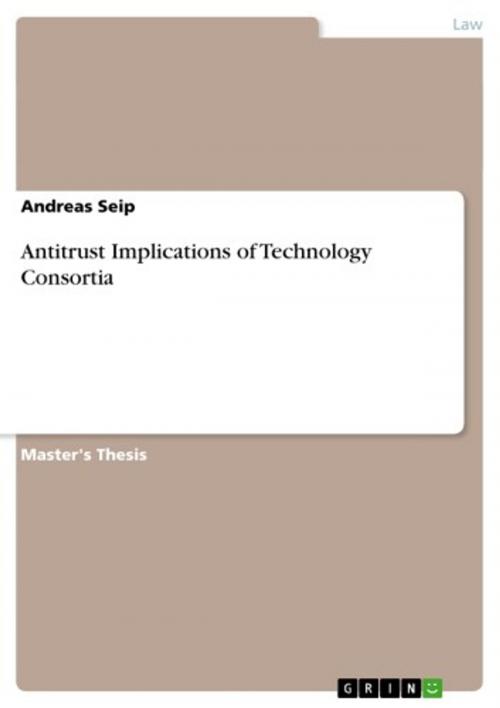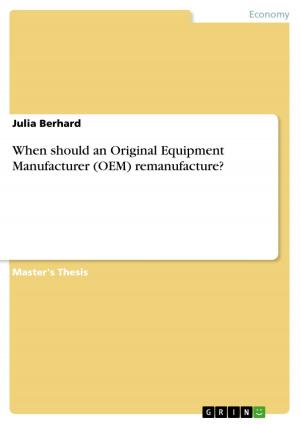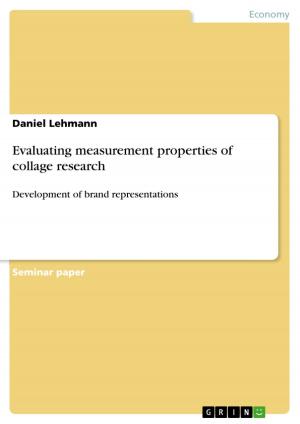| Author: | Andreas Seip | ISBN: | 9783638231633 |
| Publisher: | GRIN Publishing | Publication: | November 10, 2003 |
| Imprint: | GRIN Publishing | Language: | English |
| Author: | Andreas Seip |
| ISBN: | 9783638231633 |
| Publisher: | GRIN Publishing |
| Publication: | November 10, 2003 |
| Imprint: | GRIN Publishing |
| Language: | English |
Master's Thesis from the year 2003 in the subject Law - Civil / Private / Trade / Anti Trust Law / Business Law, grade: Distinction (14 of 15), University of Bonn (Centre for European Integration Research, Bonn), course: Centre for European Integration Research, Bonn, 89 entries in the bibliography, language: English, abstract: The Competitiveness Council (Erkki Liikanen from DG Enterprise and Information Society, Philippe Busquin from DG Research and Mario Monti from DG Competition meeting at Brussels on November 26, 2002) emphasized the need to create a European Research Area, which is to be understood as a true internal market for science and knowledge. It is particularly important to ensure consistency between the national and the EU Research and Development (R&D) policies in order to increase investment in research and enhance the innovation and technology transfer capacity. In boosting the potential of the European Research Area certain framework conditions need to be transposed into practice among which 'a competitive environment with research and innovation-friendly regulations and competition rules' is the most relevant to the present thesis. Although technology consortia are rarely subject to antitrust scrutiny, guidance is needed for a number of reasons. The very peculiar nature of technology consortia can make it hard, if not impossible, to characterize a consortium into specific categories such as horizontal, vertical or conglomerate, which in turn makes it difficult to clearly delineate any antitrust concerns. Furthermore, the European competition law regime is in a crucial transformation process. With effect of 1 May 2004, the date of entering into force of Regulation 1/2003 the whole of Article 81 will be directly applicable in the member states. Thus any anti-competitive agreement is no longer to be notified to the Commission for a compatibility assessment under Article 81(3). Instead companies will have to assess the compatibility of their agreement with Article 81 on their own. In seeking guidance, the Commission likes to refer to its forty year long decisional practice during which it has had the monopoly to handle notified cases in respect of Article 81(3). Not surprisingly, uncertainties still remain. This is not to say that the decisions are not helpful, but rather that law is subject to interpretational developments. It is particularly competition law that is rightfully influenced by economics and must be determined in the individual setting. The law can not therefore provide answers to all issues that have arisen due to commercial developments and changing technology, which is why guidance on specific industry aspects actually adds value. [...]
Master's Thesis from the year 2003 in the subject Law - Civil / Private / Trade / Anti Trust Law / Business Law, grade: Distinction (14 of 15), University of Bonn (Centre for European Integration Research, Bonn), course: Centre for European Integration Research, Bonn, 89 entries in the bibliography, language: English, abstract: The Competitiveness Council (Erkki Liikanen from DG Enterprise and Information Society, Philippe Busquin from DG Research and Mario Monti from DG Competition meeting at Brussels on November 26, 2002) emphasized the need to create a European Research Area, which is to be understood as a true internal market for science and knowledge. It is particularly important to ensure consistency between the national and the EU Research and Development (R&D) policies in order to increase investment in research and enhance the innovation and technology transfer capacity. In boosting the potential of the European Research Area certain framework conditions need to be transposed into practice among which 'a competitive environment with research and innovation-friendly regulations and competition rules' is the most relevant to the present thesis. Although technology consortia are rarely subject to antitrust scrutiny, guidance is needed for a number of reasons. The very peculiar nature of technology consortia can make it hard, if not impossible, to characterize a consortium into specific categories such as horizontal, vertical or conglomerate, which in turn makes it difficult to clearly delineate any antitrust concerns. Furthermore, the European competition law regime is in a crucial transformation process. With effect of 1 May 2004, the date of entering into force of Regulation 1/2003 the whole of Article 81 will be directly applicable in the member states. Thus any anti-competitive agreement is no longer to be notified to the Commission for a compatibility assessment under Article 81(3). Instead companies will have to assess the compatibility of their agreement with Article 81 on their own. In seeking guidance, the Commission likes to refer to its forty year long decisional practice during which it has had the monopoly to handle notified cases in respect of Article 81(3). Not surprisingly, uncertainties still remain. This is not to say that the decisions are not helpful, but rather that law is subject to interpretational developments. It is particularly competition law that is rightfully influenced by economics and must be determined in the individual setting. The law can not therefore provide answers to all issues that have arisen due to commercial developments and changing technology, which is why guidance on specific industry aspects actually adds value. [...]















